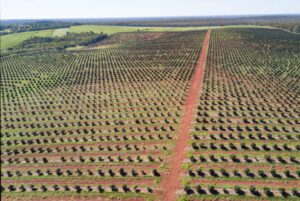Do mutual will obligations between spouses establish a trust that gives rise to a caveatable interest upon one of their deaths in favour of a beneficiary over what is said to be trust property?
Harry Thynne believed that it did and asked the NSW Supreme Court to declare that a property left outright to his stepmother Victoria under his late father’s will was in fact held on such a trust.
 Harry’s father James died on 22 June 2011. Harry was James’ son from his first marriage to Catherine. James had another son, Patrick, from his second marriage to Victoria. James and Victoria remained married and were together at the time of James’ death.
Harry’s father James died on 22 June 2011. Harry was James’ son from his first marriage to Catherine. James had another son, Patrick, from his second marriage to Victoria. James and Victoria remained married and were together at the time of James’ death.
The property the subject of the proceedings was a strata title unit owned by James at Mona Road, Darling Point in Sydney. There was also a working cattle and macadamia nut farm, “Elanora”, near Nambucca Heads in New South Wales that had been James’ parents’ home but had been transferred in 1981 to James’ company Jevny Pty Ltd as trustee for the Thynne Family Trust.
James made his last will in 2011.
Relevantly, the Mona Road property was left to Victoria, as was James’ remaining interest in Jevny and the farming business on “Elanora” owned by Jevny.
The residue of the estate was directed to be held on trust for Harry and Patrick until they were 25.
The gift of the Mona Road property to Victoria under the will was expressed to be made on the understanding that Victoria would, in her Will, then leave the Mona Road property equally to Harry and Patrick as tenants in common, less any expenses incurred by Victoria for her or Patrick’s maintenance, or expenses incurred in maintaining Mona Road or “Elanora”.
At the same time James made his will, he and Victoria signed a Memorandum of Wishes to clarify its terms.
Under that MOW, Victoria was to assume sole management of the farm held by the family trust and have unfettered discretion to make decisions on all matters relating to the farm. It was James’ wish that the farm be carried on a going concern unless it became financially unviable to do so.
Victoria was also given priority over all others to decide who lived at “Elanora”, including to live there herself during her lifetime without interference if she chose to do so.
It also provided that if the farm was to be sold, the trust should be wound up and its net assets distributed as 50% to Harry, and 50% to Victoria or to Patrick if Victoria so wished.
The MOW confirmed that Victoria was to leave Mona Road, any other property purchased to replace it, or whatever remained, to Harry and Patrick.
Some 10 years later Victoria gave a mortgage over the Mona Rad property of which she was the sole owner to Westpac.
In response, Harry commenced the proceedings claiming the existence of a trust limiting what Victoria could do with Mona Road. He also lodged a caveat over that Mona Road on the basis of his interest in that claimed trust.
Harry contended that Victoria’s right to the Mona Road property was limited by the MOW, claiming its effect was to create a trust that did not permit Victoria as trustee to grant any mortgage over it.
Justice David Hammerschlag did not agree.
His honour held that the terms of the agreement set out in the MOW meant that like any mutual will agreement, Victoria was able to deal with and enjoy the assets left to her absolutely during her lifetime.
The only limitation – he ruled – was that Victoria could not give away her interest in that property in order to defeat the agreement. He observed there was no indication of Victoria having taken any steps to do so.
His honour also noted that such “floating obligation … [would] crystallise into a trust on what is left of Mona Road or its proceeds on Victoria’s death,” but that Harry had no trust interest in the property until then.
In the absence of any beneficial addressed, Harry likewise had no caveatable interest.
The court ordered that the caveat be removed.
The court also considered whether even if Harry did have a caveatable interest, any caveat was detrimental to the conduct of the farming business on the property which – to secure adequate funding – necessitated the granting of the Westpac mortgage.
His Honour ruled that this ‘balance of inconvenience’ argument, whilst not strong, had not been countered by any contention from Harry, and concluded the caveat should also be removed on those grounds.
The ruling in relation to the legal effect of a mutual will agreement is identical to that recently delivered in Queensland in Forster v Forster [2022] QSC 30.
Harry Bernard Thynne v Jevny Pty Limited and Anor [2022] NSWSC 1774 Read case
